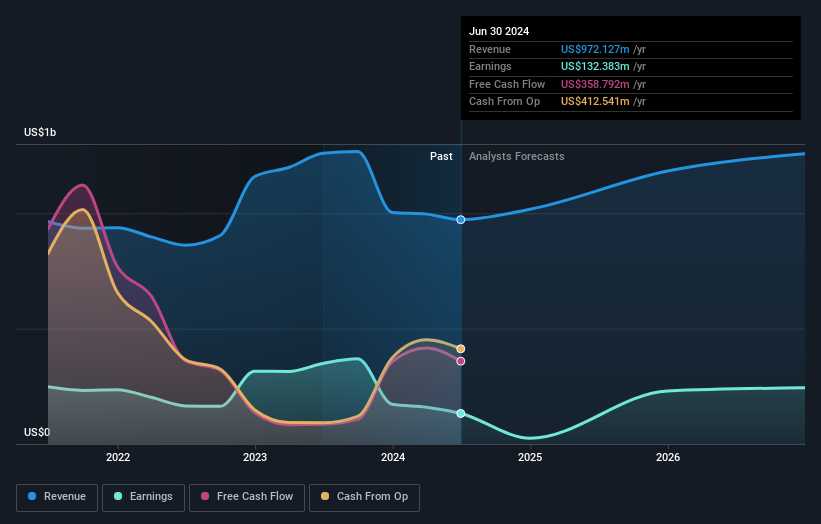- United States
- /
- Banks
- /
- NasdaqGS:TCBI
Texas Capital Bancshares (NASDAQ:TCBI) investors are up 3.9% in the past week, but earnings have declined over the last five years

The main point of investing for the long term is to make money. Better yet, you'd like to see the share price move up more than the market average. Unfortunately for shareholders, while the Texas Capital Bancshares, Inc. (NASDAQ:TCBI) share price is up 34% in the last five years, that's less than the market return. However, more recent buyers should be happy with the increase of 26% over the last year.
Since the stock has added US$128m to its market cap in the past week alone, let's see if underlying performance has been driving long-term returns.
View our latest analysis for Texas Capital Bancshares
While markets are a powerful pricing mechanism, share prices reflect investor sentiment, not just underlying business performance. By comparing earnings per share (EPS) and share price changes over time, we can get a feel for how investor attitudes to a company have morphed over time.
Texas Capital Bancshares' earnings per share are down 14% per year, despite strong share price performance over five years.
This means it's unlikely the market is judging the company based on earnings growth. Since the change in EPS doesn't seem to correlate with the change in share price, it's worth taking a look at other metrics.
In contrast revenue growth of 4.9% per year is probably viewed as evidence that Texas Capital Bancshares is growing, a real positive. In that case, the company may be sacrificing current earnings per share to drive growth.
The image below shows how earnings and revenue have tracked over time (if you click on the image you can see greater detail).

We like that insiders have been buying shares in the last twelve months. Having said that, most people consider earnings and revenue growth trends to be a more meaningful guide to the business. So we recommend checking out this free report showing consensus forecasts
A Different Perspective
Texas Capital Bancshares shareholders gained a total return of 26% during the year. But that was short of the market average. The silver lining is that the gain was actually better than the average annual return of 6% per year over five year. It is possible that returns will improve along with the business fundamentals. While it is well worth considering the different impacts that market conditions can have on the share price, there are other factors that are even more important. Consider for instance, the ever-present spectre of investment risk. We've identified 1 warning sign with Texas Capital Bancshares , and understanding them should be part of your investment process.
Texas Capital Bancshares is not the only stock that insiders are buying. For those who like to find lesser know companies this free list of growing companies with recent insider purchasing, could be just the ticket.
Please note, the market returns quoted in this article reflect the market weighted average returns of stocks that currently trade on American exchanges.
Valuation is complex, but we're here to simplify it.
Discover if Texas Capital Bancshares might be undervalued or overvalued with our detailed analysis, featuring fair value estimates, potential risks, dividends, insider trades, and its financial condition.
Access Free AnalysisHave feedback on this article? Concerned about the content? Get in touch with us directly. Alternatively, email editorial-team (at) simplywallst.com.
This article by Simply Wall St is general in nature. We provide commentary based on historical data and analyst forecasts only using an unbiased methodology and our articles are not intended to be financial advice. It does not constitute a recommendation to buy or sell any stock, and does not take account of your objectives, or your financial situation. We aim to bring you long-term focused analysis driven by fundamental data. Note that our analysis may not factor in the latest price-sensitive company announcements or qualitative material. Simply Wall St has no position in any stocks mentioned.
About NasdaqGS:TCBI
Texas Capital Bancshares
Operates as the bank holding company for Texas Capital Bank, is a full-service financial services firm that delivers customized solutions to businesses, entrepreneurs, and individual customers.
Flawless balance sheet with reasonable growth potential.
Similar Companies
Market Insights
Community Narratives



